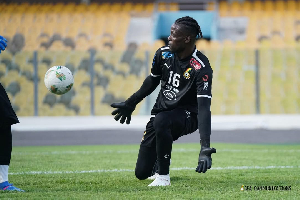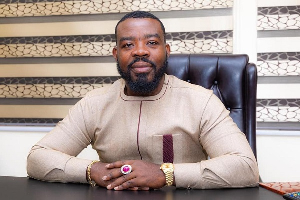Ho, Dec 20, GNA- The Volta Regional Minister, Mr Kwasi Owusu-Yeboa on Monday told the Volta Regional House of Chiefs that the responsibility to elevate traditional areas to paramount status rested with the Chieftaincy institution rather than the government.
This is because the authority to modify and review chieftaincy is the prerogative of Chiefs themselves, and that the government could only help, but not to take the initiative to avoid being accused of doctoring such elevations for political expediency.
Mr Owusu-Yeboa was addressing the end- of-year general meeting of the Volta Regional House of Chiefs at Ho.
"If the Regional House of Chiefs will unanimously back past initiatives as the true feeling of the Regional House we will be comfortable", he said.
Mr Owusu-Yeboa acknowledged that a large measure of consultations have been done on the matter through the Traditional Councils, Regional House of Chiefs and the National House of Chiefs but in-between the National House of Chiefs and after, the issue generated controversy because of "tampering and tinkering".
He said the effect has been the "pigeon-holing of yourselves". Mr Owusu-Yeboa said there would be no problems per se with the issue of elevations of Chiefs in the Volta Region, which has a very peculiar chieftaincy situation provided there were incontrovertible historical evidence to claims being made.
He asked them not to forget the financial implications and limited space to accommodate 200 Paramount Chiefs in the Regional House of Chiefs.
Mr Owusu-Yeboa appealed to the House to constitute a special Committee to deal with the problem of disputes over land whose resources have investment potentials.
He said investment in the salt potentials in the region was already being threatened by agitations to be contacted directly by investors thus skipping the necessary preparatory work which had to be made prior to their being contacted.
Mr Owusu-Yeboa said though as Chiefs, they might not have direct beneficial interests in such potentials, but they nevertheless have " jurisdictional control and authority" over such resources by virtue of their traditional positions.
He told them that they have to protect the collective interests of their communities and the region when it comes to investment and to educate their people to convert part of the compensations accruing from future investments into shares for the benefit of posterity.
Mr Owusu-Yeboa told the House that the government appreciates the partnership between the government and Chiefs for the sustenance of peace and socio-economic development.
He therefore, urged Chiefs to take individual initiatives to settle disputes between their colleagues to prevent such situations from degenerating into bloody conflicts.
"Government will depend on you to fulfil our mandate and we will also assist you to carry out your traditional mandate", he said. Togbega Gabusu VI, President of the House expressed regret that the, "operations of the House became static as no activity could take place", throughout the year for lack of grants.
"It was only a relieving moment when grants were finally released just last month that enabled the summon of this particular end of year meeting", he said.
Togbega Gabusu said that notwithstanding, the House was able to establish the "Volta Region House of Chiefs HIV/AIDS Sensitisation Project", which with the aid of the Ghana AIDS Commission, organised workshops for Chiefs in the 118 traditional areas of the region. That had resulted in the identification of a widowhood rite in some traditional areas requiring widows to have sex with any man outside their areas, whether healthy, unhealthy or insane immediately after removing her mourning clothes which has a high risk for contracting and spreading HIV/AIDS.
"The traditional areas agreed with the Project Staff that it was outmoded custom and must be abolished", Togbega Gabusu said.
Regional News of Saturday, 20 December 2003
Source: GNA












